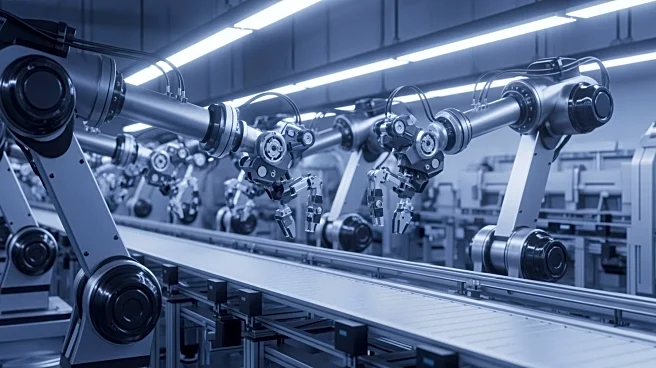What's Happening?
Tesla Inc. reported a net profit of $1.37 billion for the third quarter, with revenues reaching $28.1 billion. Despite higher costs impacting margins, CEO Elon Musk expressed confidence in the company's
self-driving technology, indicating plans to expand production rapidly. Tesla delivered over 497,000 vehicles in the quarter, a 7% increase from the previous year, driven by consumer demand ahead of the expiration of a $7,500 tax credit. The company's operating margin was 5.8%, down from the previous year but an improvement from the second quarter. CFO Vaibhav Taneja noted increased operating expenses due to investments in AI chips and legal costs. Tesla plans to increase capital spending significantly in 2026, focusing on automotive growth and AI initiatives.
Why It's Important?
Tesla's decision to ramp up production could significantly impact the electric vehicle market, potentially increasing competition and influencing pricing strategies. The expiration of tax credits may create uncertainty in the EV market, affecting consumer demand. Tesla's focus on self-driving technology and AI could position it as a leader in innovation, but rising costs and tariffs pose challenges. The company's ability to balance growth with profitability will be crucial as it navigates these dynamics. Investors and industry stakeholders will closely watch Tesla's expansion plans and their implications for market share and technological advancements.
What's Next?
Tesla plans to increase production capacity at its factories in California, Texas, Berlin, and Shanghai, aiming to produce more than 2.2 million vehicles annually. The company will prioritize increasing production of its cybercab model in Texas. Musk's comments suggest that Tesla is prepared to expand rapidly, potentially sacrificing margins for market share. The company's focus on AI and self-driving technology will continue to be a key area of investment. Stakeholders will monitor Tesla's ability to execute these plans amid economic uncertainties and competitive pressures.
Beyond the Headlines
Tesla's expansion plans highlight the broader industry trend towards automation and AI integration in automotive manufacturing. The company's investments in AI and self-driving technology could drive long-term shifts in transportation, influencing regulatory frameworks and consumer behavior. Ethical considerations around AI and automation, such as job displacement and safety, may become increasingly relevant as Tesla advances its technology. The company's approach to balancing innovation with profitability will be a critical factor in its future success.











